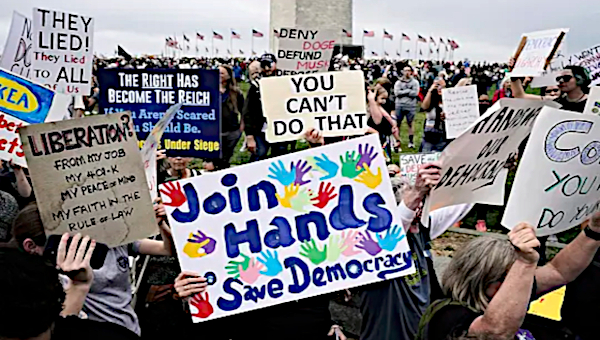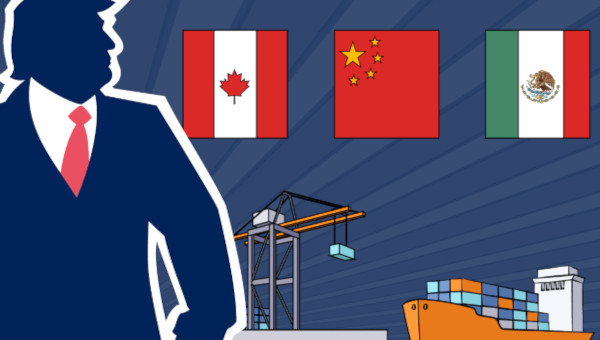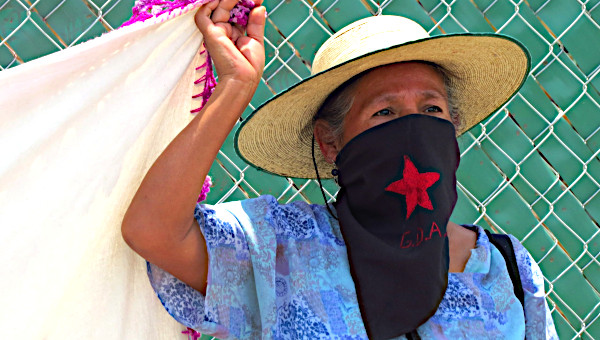Canadian Imperalism Stumbles Onward
Imperialism is obviously not always conducted with the frightening roar and unmistakeable destruction of shock and awe. In such moments does the power and horror of imperialism become crystal clear. More often than not, though, imperialist power is projected less dramatically: diplomatic meddling, funding or tacitly supporting a compliant organization over a non-compliant one in a foreign country, trying to isolate “rogue states,” protecting domestic capital from meaningful oversights of its international activities, and so on.
This is certainly the case for a sub-superpower imperialist like Canada. Make no mistake, the Canadian government likes the shock and awe. The recent extension of Canada’s participation in the bloody occupation of Afghanistan makes that clear. But Canada has become over the last 25 years one of the largest foreign investors in the Third World, most notably (though not exclusively) in Latin America and the Caribbean. In 2007, Canadian corporations made over $23-billion after tax from the resources and labour of the Third World. Canada has a definite stake in the subordination of this region, and this can’t be accomplished by military force alone.

It behooves us, therefore, to keep a vigilant eye on the various actions taken by the Canadian government to advance Canada’s interests in the world. Canada is by no means always successful, but even its less successful moments can be telling of what Canada’s real interests abroad are and what many people in the Third World think of Canadian practice. In what follows I offer a brief autumn review of imperialist Canada.
Tough Luck in the Security Council
It’s been a bit of a rollercoaster ride for Canadian imperialism in the last couple of months. In October Canada lost its bid to win a Security Council seat. In the end, the vote for the much sought-after seat wasn’t close, and Canada withdrew after the second round, conceding to smaller and debt-plagued Portugal. The Tories blamed Liberal leader Michael Ignatieff, who definitely is worth criticism on a score of issues (support for torture, failed Employment Insurance reform, general arrogance etc.).
But the defeat should be seen as a rebuke of the Tories’ aggressive foreign policy stance, not least of which is its unwavering support for Israel. I could probably add to that its pathetic contribution to international aid, its attempt to scuttle the Democratic Republic of the Congo’s efforts to get some of its foreign debt written off because the African nation had the temerity to shut down a Canadian mining project, or its support for the 2009 Honduran coup. And that’s the shortlist.
Ecuador in Its Sights
I could’ve added Canada’s behaviour toward Ecuador. On September 30, a section of Ecuador’s police and military organized demonstrations against the moderately left-of-centre government of Rafael Correa. The demonstrations quickly turned violent and Correa was actually taken hostage by police. The president was eventually freed, and the right-wing uprising put down, by military forces loyal to the government. Correa and most supporters of the government called the military and police uprising an attempted coup.
Most South American governments and regional organizations were quick to condemn the coup effort. Canada, however, didn’t issue its press release, in which it stated that it was “concerned about the growing unrest in Ecuador” – no mention of a coup attempt – until after Correa was freed. In a move echoing its initial response to the coup against the very moderate reformist government of Manuel Zelaya in Honduras, the release then calls “on all parties to refrain from violence and any other actions that could imperil the rule of law and the country’s democratic institutions.” But, as in Honduras, only one side was attempting a coup and trying to undermine the country’s “democratic institutions.” The implication is that violence wasn’t simply caused by the coup plotters, and that anti-coup forces bear some responsibility for the chaotic events of the 30th.
At the October 6 meeting of the Permanent Council of the Organization of American States (OAS), held to discuss the OAS Secretary General’s visit to Ecuador, Canada took the opportunity to criticize what it views as the democratic deficiencies of Correa’s Ecuador and other left-of-centre governments in the region. Canadian Ambassador, Allan Culham, had this to say:
“I would like to take this opportunity to remind us all of what I think is an important element of governance that we should not forget, and that is the need to create democratic spaces which are respectful of dialogue and respectful of all sectors of society to be sure that they have the opportunities to express views [yes, this is a representative of the Conservative government speaking!] … The creation of setting this tone of governance is an important part of all of our joint responsibilities and the enhancing of democratic principles throughout the hemisphere.”
The context for Canada’s unenthusiastic criticism of the coup attempt isn’t hard to discern. Led by its insatiable mining industry, Canada is a major foreign investor in the Andean country. But there is a history of mass mobilization against Canadian mining and oil companies in Ecuador, and Canadian capital hasn’t had it easy since Correa was elected in 2006. Elected in part on a wave of anti-neoliberal sentiment and social movement struggle, the Correa government proposed changes to its mining and taxation policy, calling for, among other things, greater regulation and state involvement in the resource sector and higher taxes and royalties on foreign investment. Canadian companies, with the support of the Quito embassy, responded with a direct lobbying campaign to water down the legislation.
While the proposed mining policy was weakened, and Correa has declared his support for more “responsible” mining development led by foreign companies and attacked indigenous organizations and activists opposing the destruction of their natural resources, Canada is still clearly unhappy with the Ecuadorian government. The mining law leaves open the possibility of higher royalties on a per-case basis and Canada is still unsure of how committed Correa really is to giving foreign investors the full support and openness they prefer (and usually are provided in those mining codes funded by the Canadian International Development Agency [CIDA]). Canada wants governments in the south completely prostrate, not just on their knees.
The fact that the Correa government joined the Bolivarian Alliance for the People of Our America (ALBA), the regional anti-neoliberal alliance of states led by Venezuela, adds to the hostility of the Canadian government. ALBA countries are routinely criticized (often indirectly) by Canadian politicians and officials for adopting, to quote Peter Kent’s recent speech to the OAS, “isolationist” economic policies. Any friend of Venezuela is an enemy of Canada.
There is also the matter of the new constitution, written by a constituent assembly Correa’s government convoked. Although critics on the left charge (and quite fairly in my view) that Correa is not fully respecting the constitution, particularly when it comes to his support for large-scale resource development, the constitution formally supports a more inclusive political system, doesn’t embrace neoliberalism, and defends the rights of nature and “pluri-nationalism” in recognition of indigenous peoples in Ecuador. In other words, even if Correa’s support for some aspects of the constitution is in the end quite tepid, the constitution still reflects a developmental vision quite distant from that of the Canadian state and capital that could be seen as threatening Canadian interests should it actually be fully respected.
The Correa government has also indicated its plans to withdraw from the Foreign Investment Protection Agreement it has with Canada. Modelled on Chapter 11 of NAFTA, FIPAs are designed to lock in the rights of foreign investors. In response to Ecuador’s announcement, at least three trips to Ecuador by Canadian politicians have been made to discuss the country’s investment policy in the last 15 months. It’s also likely that this has consumed much of the Quito embassy’s time and energy over the last year, even if such information isn’t readily available to the public.
Facing Down the Scourge of Mining Standards …
But all wasn’t lost for Canadian imperialism in the last couple of months (and the Ecuadorian story isn’t finished). Bill c-300, the private member’s bill to impose very modest standards on the international practices of Canadian mining companies (Canada has the largest mining industry in the world), was defeated at the end of October after furious lobbying by the mining industry. Actually put forward by a Liberal MP, John McKay, the bill gathered steam in the wake of ongoing human rights and environmental violations in the Third World by Canadian companies (at least five opponents of Canadian investment have been assassinated in the last two years in Central America and Mexico, for starters) and the disclosure of a report commissioned and subsequently buried by the Prospectors and Developers Association of Canada (PDAC), which found – surprise! – that Canadian companies have by far the worst human rights and environmental record in the world. Without close competitor.
The bill merely called for the withdrawal of public financial or political support from companies found to have committed human rights or environmental offences. There was no threat of criminal sanction or loss of incorporation contained within it. The Tories opposed it, of course, but they don’t have a majority. The opposition parties weren’t whipped for the vote, and in the end 13 Liberals (including Ignatieff), 4 NDPers and 5 Bloquistes “missed” it. It’s probably a good thing for Canadian embassies throughout the Americas, though, since had the bill succeeded they likely wouldn’t have much to do anymore.
… and Democracy in Haiti
Canada has also been continuing with its commitment to undermine democracy in Haiti. Presidential and legislative elections will be held on November 28 in the extremely impoverished country. Once again, however, Fanmi Lavalas (FL) has been banned on extremely flimsy procedural grounds from participating by the country’s electoral council, which was largely handpicked by the administration of outgoing president and imperial ally, René Préval. FL was led by president Jean-Bertrand Aristide, with widespread support among the Haitian poor, before a Canadian-, American- and French-backed coup forced him from power in 2004 and rolled back his moderately reformist social agenda.
Despite FL’s exclusion (and that of 13 other parties), Canada has committed $5.8-million in financial assistance to the sham election. It hasn’t publicly said a thing about the ban on FL or the continuing exile of the immensely popular Aristide. A CIDA representative, clearly uncomfortable talking about funding an election in which a main party is excluded, told me that “we can’t comment on why the party is not participating.” When I told her why FL isn’t participating, she added, “We don’t control their [the Haitian electoral council’s] decisions.” No, CIDA just funds them. I asked if CIDA at least had any concerns about the ban, and she replied, “I can’t answer that question for the whole of CIDA.”
FL was also banned from senate elections in April, 2009. It organized a boycott in response, and the turnout was less than 10%.
The election is taking place as Haitians are still trying to recover from the devastating earthquake of last January. However, much of the aid pledged by donor nations, including Canada, hasn’t been dispersed, and most of the 1.5 million people displaced in the earthquake still live in squalid conditions with little access to clean water, healthcare or even a tent. And now they face a cholera outbreak. Canada did, however, announce new aid measures on November 4 – $9.5-million for the construction of new headquarters for the Haitian National Police. “Security” has been a big part of Canadian aid since the 2004 coup. Canada has been funding a police force that has engaged in human rights violations and prisons that have been overcrowded with coup opponents. This security aid will be more pressing in the months ahead, as protests against the UN occupation and illegitimate government increase.
Imperialist Canada
On balance, then, not a bad couple of months for Canadian imperialism. No Security Council seat, to be sure, and no coup in Ecuador, if perhaps a reminder to Correa to be careful. But no mining legislation or democracy in Haiti either.
Balance sheet aside, though, it’s clear that advancing its own self-interest is central to Canada’s engagement in the Third World, regardless of the cost to the people living there. Beyond the shock and awe of Afghanistan, there still lies imperialist Canada: surveying the Third World landscape, ready to project its power and undermine struggles for social justice. •





